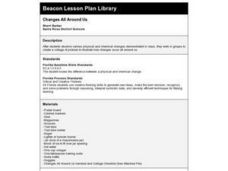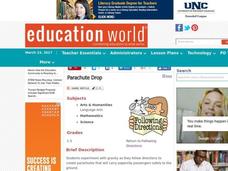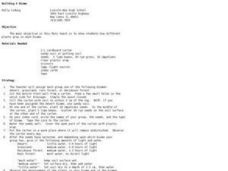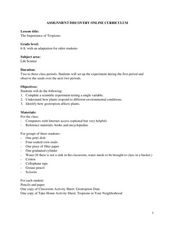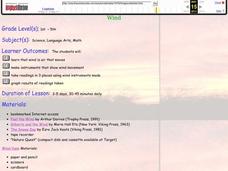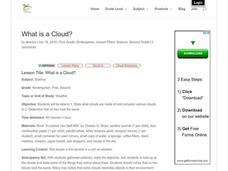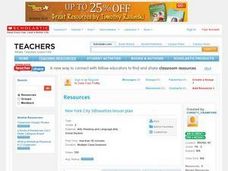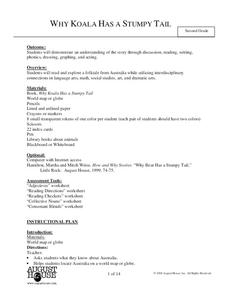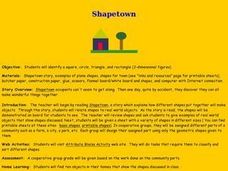Curated OER
What Is A Community?
Young scholars engage in a lesson which introduces the definition of a community and challenges them to explore the characteristics of their own community. This lesson uses the true story of Humphrey the Lost Whale as an illustration of...
Curated OER
Changes All Around Us
Sixth graders, in groups, observe the difference between physical and chemical changes and create a collage of pictures to show the difference.
Curated OER
Electric Blues
Students brainstorm a list of electrical devices used in their home. They read an article about electricity usage in a heat wave. In groups, they create public service announcements promoting energy conservation. They share their ideas...
Curated OER
Under Pressure
Students view a video clip on dams. They discuss how the dam is reinforced and how it holds the pressure of water. They participate in an activity in which they use liter bottles to represent the dam.
Curated OER
VSEPR THEORY: BALLOONS AND MOLECULES
Students listen to the teacher introduce VSEPR theory and explain molecular geometry. They use balloons to visualize the shape of orbitals. Students create visuals of molecular orbitals with strings and balloons.
Curated OER
Colorful Paper Masks
Students create individual masks using poster paper, string or elastic, and basic art supplies in this wonderful Art lesson for any level. Emphasis is placed on the discussion of cultural and personal uses of masks and personal creativity.
Curated OER
Parachute Drop
Students explore the effects of gravity. They create a parachute and make predictions about the effect of adding weight to the bottom of the parachute. Students record and interpret results of parachute experiments.
Curated OER
Environment: Sounds of the Natural World
Second graders describe and imitate sounds from the natural environment including rain and snow. After listing materials that could be used to make rainsticks, they create their own instruments from cardboard tubes,beans, and sand. To...
Curated OER
Career: Designing a Room
Young scholars apply previous knowledge to design their own great room. Using appropriate color schemes, they also consider room traffic patterns and furniture arrangements. While designing their areas, students give attention to...
Curated OER
Making Sense Of A Round World On A Flat Surface
Learners engage in a instructional activity that is concerned with the development of geography skills. They take part in a number of activities that center around finding and traveling to different locations. The instructional activity...
Curated OER
Sergei Prokofiev's "peter And the Wolf": Learning And Creating
Students write their own version of "Peter and the Wolf". They explore the characters and the instruments that represent the characters. They use graphic organizing software to brainstorm ideas for characters and story lines for...
Curated OER
Build a Sun Clinometer
In this sun clinometer worksheet, students build a sun clinometer using a protractor, thread, straw, cardboard and a paper clip. They are graded using a rubric on their clinometer and they answer questions about the structure of their...
Curated OER
Plant Systems
Second graders learn about plant systems and how plants grow and function. In this plant lesson plan, 2nd graders collect data based on roots, leaves, terrariums, plant uses, and locations of certain kinds of plants. They fill out...
Curated OER
Building a Biome
Young scholars investigate how plants grow in different biomes. In this biomes lesson plan, students plant sees of impatiens, lima beans and rye seeds in egg cartons. When the plants begin to grow they simulate the assigned biome...
Curated OER
The Importance of Tropisms
Young scholars investigate plant tropisms using the scientific method. In this life science lesson, students learn about tropisms and test the response of corn seedlings to gravity. Response questions, extensions, and an adaptation...
Curated OER
Terrariums: A Look at the Living and Nonliving World
Third graders examine life in a terrarium and relate it to life in a larger environment. For this terrarium lesson, 3rd graders examine how living and non-living things work together by examining the changes in a terrarium. They make...
Curated OER
Utah Weather
Fourth graders diagram the weather in Utah through the use of a glyph. In this Utah weather lesson, 4th graders create weather glyphs of different areas in the state. Students answer questions about the weather and then compare their...
Curated OER
Wind
Learners make a wind vane, anemometer, wind spiral, and wind streamer to calculate wind movement. In this wind lesson plan, students test each of their wind instruments, and graph the results of the wind speed in different locations.
Curated OER
What is a Cloud?
Students identify what clouds are made of. In this weather science lesson, students look at clouds outside the window and draw what they see in their journals. Students read the book It Looked Like Spilled Milk and identify what clouds...
Curated OER
Silouettes of New York City
Second graders create a New York City silhouette. In this visual arts lesson, 2nd graders view the picture book, Uptown, and identify the silhouettes. Students use construction paper, paint, and a flashlight to create artistic...
Curated OER
Why Koala Has a Stumpy Tail
Second graders explore Australian folktales. In this folktales lesson, 2nd graders gain knowledge about Australia and it's animals by reading books and discussion. Students find the adjectives in the book and write what they describe....
Curated OER
Shapetown
Students identify basic geometric shapes. In this geometry lesson, students read the book Shapetown and identify the various shapes from the story. Students are given a sheet and draw part of a town using only shapes.
Curated OER
Local Habitats
Students create dioramas that depict a habitat. In this habitat lesson, students use a variety of art items to develop either a marine, freshwater/pond, or forest habitat in a box. They write an expository essay about their habitat, and...
Curated OER
Socialism vs Capitalism
Students engage in an activity to show the differences between Socialism and Capitalism. In this socialism and capitalism instructional activity, students break into groups and are given scenarios to analyze. Students respond to each...



